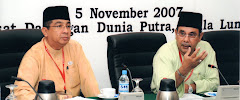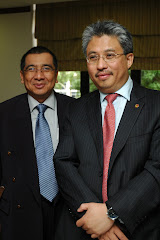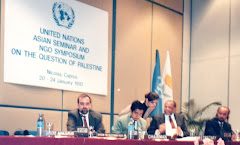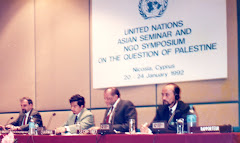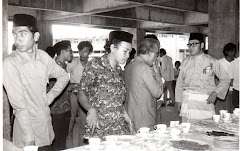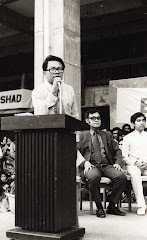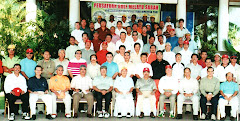THE grainy photograph of Datuk Seri Hadi Awang in a blue hospital gown and giving what looked like a high-five has been making the rounds on Facebook.
But Hadi was probably waving because he is not the high-five type. The PAS president was almost unrecognisable without his trademark kopiah and glasses and it was also the first time that anyone had seen his legs which looked rather fair.
Hadi, according to his long-time political secretary Dr Ahmad Samsuri Mokhtar, has recovered but doctors in the Istanbul hospital wanted him to be completely stable before he flies home.
“His appetite has improved, he can also joke now,” said Dr Samsuri who was with his boss in Istanbul.
Hadi, 66, was attending a conference in the Turkish city when he experienced chest pains, the preferred euphemism for a heart attack.
Prime Minister Datuk Seri Najib Tun Razak immediately instructed the Malaysian Ambassador in Ankara to take care of Hadi’s needs and Turkey Prime Minister Recep Tayyip Erdogan also telephoned to wish him well.
There has been a groundswell of prayers and good wishes for the PAS leader.
Friends of Barisan Nasional, a Facebook fan page, gave thanks to Allah for Hadi’s recovery and posted a picture of Hadi on the hospital bed. The post drew 18,000 likes and hundreds of well-meaning comments plus a few cheeky ones like, “Thought he had a phobia for blue coloured clothes.”
Kelantan Mentri Besar Datuk Ahmad Yaakob flew in on Wednesday to see Hadi. It was quite a thrill for party members to finally have a Mentri Besar who has the energy to arrive in Istanbul at 5.30am, spend the day with Hadi and take the evening flight back to Malaysia. Ahmad or Datuk Mat, as he is known, has become the man to watch in PAS for several reasons. First, is the fact that the hudud law initiative is coming from his government in Kelantan. That has lent him an image as a champion of the faith.
Second, is his sense of conviction. The young Turks in PAS want a leader who can put the party back on their Islamist path instead of bowing to the secular demands of their partners.
They think Ahmad has those qualities and they liked it when he put DAP’s Dyana Sofya Mohd Daud in her place and asked her to learn about hudud before opening her mouth on Islam. He also rebutted DAP leaders for blaming the Teluk Intan defeat on the hudud issue.
The blame game over Teluk Intan is still going on and a political pattern has emerged after six by-elections since May 5.
The first five by-elections were basically about the rival coalitions defending and holding on to what they had. Teluk Intan was the first time an incumbent lost to the challenger. More significantly, the loser is the most powerful Chinese party today while the winner is a party everyone had given up for dead.
The other thing is the plunging voter turnout. The turnout for the Kuala Besut and Sungai Limau by-elections was 80% and 85% respectively, just slightly lower than in the general election.
The turnout for Kajang, followed by Balingian, was around 72%. It plunged to 56% in Bukit Gelugor and 67% in Teluk Intan.
Kajang was the “turning point by-election”. The electorate, inside and outside Kajang, was turned off by the way PKR manipulated the electoral process to suit Datuk Seri Anwar Ibrahim’s agenda.
The Kajang Move was not the new politics they had been promised and damaged the image of Pakatan. It opened the eyes of many, especially that of the urban intelligentsia and younger cohort, to the fact that unprincipled politicians can be found on both sides of the divide.
The cannot-be-bothered attitude was repeated in Bukit Gelugor although possibly for a different reason. Passing a seat from father to son is okay for the opposition diehards but it is so old politics.
The cynicism among the swing group or fencesitters who had made such a difference in the general election is growing although they are still not with Barisan.
Teluk Intan was a warning of what can happen when voters are taken for granted. An over-confident DAP decided to experiment with a Malay candidate just as Chinese phobia over hudud law was building up. The result was that only about 60% of Chinese turned out to vote.
Sin Chew Daily recently listed a string of reasons for the loss of confidence in Pakatan. In Selangor, the reasons included the massive salary hike for elected representatives, the Bible seizure, the power struggle in PKR over the Mentri Besar post and the water crisis.
Pakatan’s image in Penang, according to the Sin Chew Daily report, was affected by the Chief Minister’s Mercedes Benz issue, interference in press freedom and the hike in water tariffs. But the push for hudud law takes centrestage.
“The hudud issue is a wake-up call. Many voters don’t know who to trust now,” said a businessman who owns a chain of restaurants in the Klang Valley.
The Chinese were attracted to Pakatan’s sales pitch of new politics and change. They thought they could play ball with PAS, that PAS would be more reasonable than Umno. They did not understand that issues of religion are non-negotiable for PAS.
The spectre of hudud law is playing on the psyche of many non-Muslims even though they are still unclear of its implications.
The Chinese had complained that MCA could not control Umno. But they can see now that DAP, despite having the most number of parliamentary and state seats, are just as helpless.
There is a Chinese slang phrase for this - 2x5 or 5x2, it still adds up to 10. It basically means that both sides are no different.
“All this while, they said PAS would not implement the Islamic State. But they have gone against their election promise,” said the above restaurateur.
PAS politicians have insisted that, apart from the Buku Jingga, PAS had an election agreement to cooperate with DAP while reserving its right to champion the Islamic State.
The manifesto stated that their cooperation was premised on the Welfare State concept of PAS as well as DAP’s concept of justice in accordance to the Federal Constitution. This was qualified by the statement that, “PAS reserves the right to champion the Islamic State on its own accord.”
The manifesto carried the distinctive signatures of the two top guns of PAS and DAP.
Penang Barisan chairman Teng Chang Yeow claimed that the manifesto had misled the voters.
“What it basically means is that PAS’ position on the Islamic State was clearly stated from the beginning. That’s why Pakatan is unable to stop PAS from going ahead with hudud,” said Teng.
It also explains why DAP has resorted to the “blame Umno” tactic.
A sample of the irrational stuff coming from top DAP leaders:
* Hudud is a trap set up by Umno
* Only Umno can stop hudud
* Umno is instigating PAS to implement hudud
* Non-Muslims must pressure Umno on hudud
* MCA has failed to stop Umno from supporting hudud.
It is pretty amazing that DAP is blaming Umno when it is PAS who is pushing for hudud law. This sort of illogical rhetoric is insulting to the people’s intelligence and there will be some backlash in time to come.
Do people buy this twisted logic?
“I think even the opposition diehards don’t believe it but they go along with it,” said the above restaurateur.
The thinking class sees through it and their disenchantment has translated into voter apathy and disinterest. Hence, the low voter turnout in the recent by-elections.
There have been so many uncanny coincidences in politics the last few months. For instance, MH370 disappeared in the early hours of March 8, the day associated with the 2008 political tsunami.
Karpal Singh, famous for his “over my dead body declaration” on hudud law, was killed in a road accident just as the issue erupted.
He was convicted of sedition involving the Perak Sultan shortly before his death and it did not escape notice that the tragedy happened at the Perak stretch of the highway.
Then, the Sultan of Perak passed away at the most crucial stretch of the Teluk Intan campaign. The coincidences have been mind-boggling. It is the stuff of kopitiam chatter although no one can quite connect the dots.
But, as they say, what goes around comes around.
Hadi, despite health issues, is 100% for Kelantan’s hudud move and even wants to be the one to table the bills in Parliament later this year. DAP can object to hudud till the cows come home, PAS is not budging.
Pakatan, despite the discord, is not about to break up any time soon. The coalition will hold for as long as the Selangor government is there.
They are now like a marriage where the partners have major differences but are staying together for the sake of the children and assets involved.































